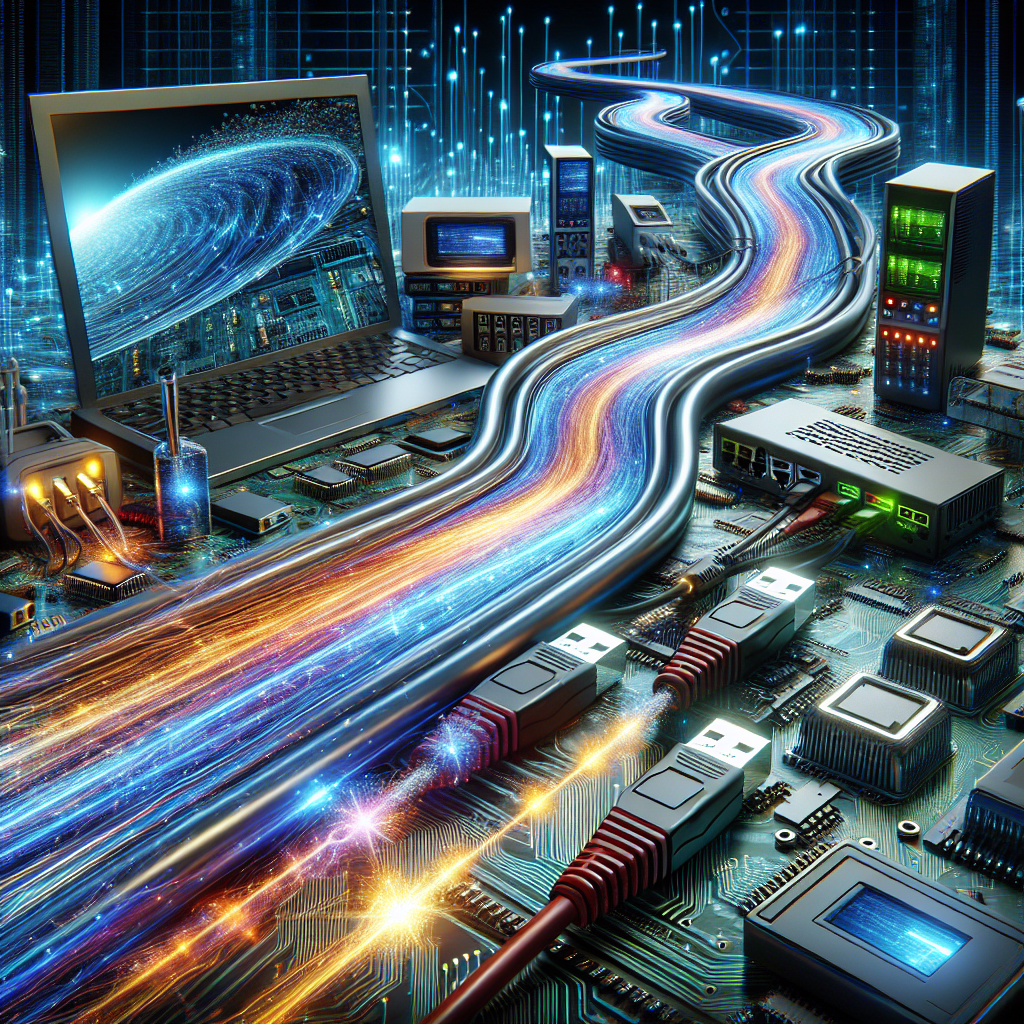In today’s fast-paced world, internet speed is more crucial than ever. The need for high-speed connections has given rise to a competitive market for the fastest cable internet speeds. With technology evolving at a rapid rate, it’s important to understand how cable internet providers are pushing the limits to deliver blazing-fast speeds to consumers. From advanced infrastructure to cutting-edge technologies, this exploration will uncover the secrets behind the fastest cable internet speeds available today. Join us as we unravel the mysteries of this high-speed world and discover how it’s shaping the way we connect and communicate in the digital age.
Understanding Cable Internet Speeds

Cable internet speeds refer to the rate at which data is transmitted over a cable internet connection. This measurement is typically expressed in megabits per second (Mbps) and determines how quickly users can download or upload data online.
Definition of Cable Internet Speeds
- Download Speed: This indicates how fast data can be transferred from the internet to a user’s device. It is crucial for activities like streaming videos, downloading files, and online gaming.
- Upload Speed: This measures the rate at which data can be sent from a user’s device to the internet. It is essential for tasks such as video conferencing, uploading large files, and online collaboration.
- Latency: While not directly related to speed, latency refers to the delay between sending and receiving data. Lower latency results in a more responsive internet connection, crucial for online gaming and video calls.
Factors Influencing Cable Internet Speeds
- Network Congestion: The number of users sharing the same cable internet connection can impact speeds during peak usage times.
- Internet Plan: Different internet service providers offer varying speed options, and users must choose a plan that meets their specific needs.
- Hardware Quality: The quality of the modem, router, and cables used can affect internet speeds.
- Distance from Provider: Proximity to the internet service provider’s network infrastructure can influence the speed and stability of the connection.
- Interference: Electrical devices, physical obstructions, and even weather conditions can cause interference and impact cable internet speeds.
Evolution of Cable Internet Speeds
Historical Perspective
In the realm of cable internet speeds, the historical perspective unveils a fascinating journey marked by significant milestones. The inception of cable internet dates back to the late 1990s when speeds were a fraction of what they are today. Initially, speeds were limited by technological constraints and infrastructure capabilities, offering users a mere glimpse of the potential for high-speed internet access.
Technological Advancements
The evolution of cable internet speeds has been propelled by groundbreaking technological advancements that have revolutionized the industry. From the introduction of DOCSIS (Data Over Cable Service Interface Specification) standards to the implementation of fiber-optic technology in hybrid fiber-coaxial networks, each innovation has played a crucial role in enhancing internet speeds. These advancements have enabled cable internet providers to deliver blazing-fast speeds that were once unimaginable, catering to the insatiable need for speed in today’s digital age.

Determining Factors for Fastest Cable Internet Speeds
Infrastructure
Determining Factors for Fastest Cable Internet Speeds
When it comes to achieving the fastest cable internet speeds, the infrastructure plays a crucial role in determining the performance. Several key factors within the infrastructure can significantly impact the speed and reliability of cable internet connections.
-
Cable Types and Quality
- The type and quality of cables used in the network infrastructure play a vital role in determining the maximum achievable speed. Higher quality cables with advanced shielding and insulation can minimize signal interference and attenuation, leading to faster data transmission rates. Fiber-optic cables, known for their high bandwidth capacity, are increasingly being used to enhance internet speeds and reliability.
-
Network Congestion Management
- Efficient management of network congestion is essential for maintaining fast internet speeds, especially during peak usage hours. Internet service providers employ various techniques such as Quality of Service (QoS) protocols and traffic shaping to prioritize data packets and ensure a smooth flow of traffic. By effectively managing network congestion, providers can prevent slowdowns and bottlenecks, thus optimizing the overall speed of cable internet connections.
Service Providers
When it comes to achieving the fastest cable internet speeds, the choice of service provider plays a crucial role in determining the quality of the connection. Here are some key points to consider:
-
Differences among providers: Not all service providers offer the same level of performance when it comes to cable internet speeds. Factors such as the infrastructure they have in place, the technology they use, and the overall quality of their network can greatly impact the speed and reliability of the internet connection they provide.
-
Importance of service packages: Service packages offered by cable internet providers can vary significantly in terms of speed, bandwidth, and pricing. It is essential for consumers to carefully evaluate the different packages available to them to ensure they are selecting one that meets their specific speed requirements. Choosing a package with higher speeds may come at a higher cost, but it can significantly enhance the overall internet experience in terms of faster downloads, smoother streaming, and reduced latency.
Modem and Router
The modem and router play a crucial role in determining the speed of cable internet connections. Modem and router compatibility with the internet service provider’s network infrastructure can significantly impact the speed and stability of the connection. Upgrading to newer modem and router models that support the latest DOCSIS standards can result in faster internet speeds and improved performance.
-
Modem Compatibility: Older modem models may not be able to support the higher speeds offered by cable internet providers. Upgrading to a modem that is compatible with the provider’s network can unlock faster speeds and optimize the connection.
-
Router Performance: The router acts as the gateway between devices in the network and the internet connection. Investing in a high-performance router with advanced features such as dual-band technology and Quality of Service (QoS) settings can help prioritize internet traffic, leading to faster speeds for devices that require it the most.
-
Wireless Technology: The type of wireless technology supported by the modem and router also plays a role in determining internet speeds. Upgrading to a router that supports Wi-Fi 6 (802.11ax) can provide faster wireless speeds and better connectivity for multiple devices simultaneously.
By ensuring that the modem and router are up to date and optimized for the internet service being provided, users can unlock the full potential of their cable internet connection and experience faster speeds for their online activities.
Advantages of Fastest Cable Internet Speeds
- Seamless streaming and gaming
Fastest cable internet speeds provide users with the ability to stream high-definition content without buffering interruptions. Whether it’s watching movies, TV shows, or live sports events, a fast internet connection ensures a smooth and enjoyable viewing experience. Gamers also benefit significantly from fast cable internet speeds, as they can engage in online gaming sessions with minimal lag and latency issues, enhancing their overall gameplay experience.
- Improved video conferencing and remote work capabilities
In today’s digital age, video conferencing has become a crucial tool for communication and collaboration. With the fastest cable internet speeds, individuals can participate in video calls with colleagues, clients, or friends without worrying about pixelated video or dropped connections. Additionally, for remote workers, a fast internet connection enables seamless access to online work platforms, file sharing, and real-time collaboration tools, boosting productivity and efficiency.
- Faster downloads and uploads

One of the primary advantages of having the fastest cable internet speeds is the ability to download and upload large files quickly and efficiently. Whether it’s downloading a software update, uploading multimedia content to a cloud storage service, or sharing documents with colleagues, a high-speed internet connection saves valuable time and ensures tasks are completed promptly. This is particularly beneficial for professionals who rely on fast data transfers for their work requirements.
Common Misconceptions about Cable Internet Speeds
In the realm of cable internet speeds, various misconceptions often lead to confusion among users. It is crucial to debunk these myths to gain a clearer understanding of what influences the fastest cable internet speeds.
- Unlimited speed claims
One prevalent misconception is the belief in unlimited speed claims by cable internet providers. While providers may advertise impressive maximum speeds, it is essential to recognize that these are typically theoretical speeds under ideal conditions. In reality, factors such as network congestion, hardware limitations, and the quality of the connection can significantly impact the actual speed experienced by users.
- Consistency of speeds
Another common misconception pertains to the consistency of cable internet speeds. Some users expect their internet speed to remain constant at all times, regardless of external factors. However, fluctuations in speed can occur due to various reasons, including peak usage hours, network maintenance, and the number of devices connected to the network. Understanding that speed variations are normal can help manage expectations and optimize the internet experience.
- Influence of distance on speeds
One often overlooked factor is the influence of distance on cable internet speeds. While cable internet is known for delivering high-speed connectivity, the physical distance between the user’s location and the provider’s network infrastructure can affect the actual speed experienced. Users situated far from the network hub may encounter slower speeds due to signal degradation over long distances. Recognizing the impact of distance can help users make informed decisions when selecting a cable internet plan that aligns with their speed requirements.
Future Prospects for Cable Internet Speeds
In the realm of cable internet speeds, the future appears promising with the advent of cutting-edge technologies poised to revolutionize connectivity for users worldwide. The evolution of cable internet is set to be propelled by a host of advancements, including the eagerly anticipated DOCSIS 4.0 standard, promising an unprecedented leap in data transmission capabilities. This next-generation technology is primed to deliver remarkable speed enhancements, paving the way for a new era of rapid and reliable internet access.
Emerging Technologies: DOCSIS 4.0
- Enhanced Bandwidth: DOCSIS 4.0 is projected to offer significantly increased bandwidth capacity, enabling providers to deliver blazing-fast internet speeds to consumers. This upgrade is poised to unlock a wealth of possibilities for bandwidth-intensive applications, such as ultra-high-definition video streaming, online gaming, and virtual reality experiences.
- Symmetrical Speeds: One of the key features of DOCSIS 4.0 is its ability to provide symmetrical upload and download speeds, a game-changer for users requiring robust upload capabilities. This parity in speeds ensures a seamless and responsive online experience, particularly beneficial for activities like video conferencing, cloud computing, and file sharing.
- Low Latency: Another notable aspect of DOCSIS 4.0 is its focus on minimizing latency, the delay between sending and receiving data packets. By optimizing latency, internet users can enjoy swift responsiveness and minimal lag times, essential for real-time applications like online gaming, video streaming, and VoIP services.
Potential Speed Enhancements
- Multi-Gigabit Speeds: As cable internet providers continue to push the boundaries of speed, the prospect of multi-gigabit connections looms on the horizon. With advancements in infrastructure and technology, users can anticipate access to internet speeds exceeding 1 Gbps, enabling seamless 4K streaming, rapid downloads, and unparalleled online performance.
- Dynamic Spectrum Sharing: Innovations like dynamic spectrum sharing hold the potential to revolutionize cable internet speeds by optimizing the allocation of available frequencies. This adaptive approach allows for more efficient use of spectrum resources, leading to enhanced network capacity and faster data transmission rates for end-users.
Impact of 5G Integration
- Convergence of Technologies: The integration of 5G technology with cable internet infrastructure represents a paradigm shift in connectivity, offering synergistic benefits for users. By leveraging the high-speed, low-latency capabilities of 5G networks in conjunction with cable internet, consumers can access a seamless and robust connectivity experience across diverse devices and applications.
- Enhanced Mobility: 5G integration with cable internet opens up new possibilities for mobile connectivity, enabling users to stay connected on the go with unparalleled speed and reliability. This convergence empowers individuals to enjoy high-performance internet access both at home and while on the move, fostering a seamless digital lifestyle characterized by continuous connectivity and enhanced productivity.
FAQs: Exploring the Need for Speed: Unraveling the Secrets of the Fastest Cable Internet Speeds
What is cable internet and how does it differ from other types of internet connections?
Cable internet is a type of broadband connection that utilizes the same coaxial cables that cable TV uses to deliver internet access to your home. It differs from other types of internet connections, such as DSL or fiber optics, in that it generally provides faster speeds and more consistent performance.
What are the fastest cable internet speeds available today?
The fastest cable internet speeds available today can reach up to 1 Gigabit per second (Gbps) or even higher in some areas. These ultra-fast speeds allow for seamless streaming, gaming, and downloading without any lag or buffering.
How can I determine if the fastest cable internet speeds are available in my area?
You can check with your local cable internet provider to see if they offer the fastest speeds in your area. Additionally, you can use online tools or websites that allow you to enter your address and compare internet speeds and providers in your area.
What factors can affect the speed of my cable internet connection?
Several factors can affect the speed of your cable internet connection, including the quality of your modem and router, the number of devices connected to your network, and the overall network traffic in your area. It’s important to regularly check and optimize these factors to ensure you are getting the fastest speeds possible.
How can I upgrade to the fastest cable internet speeds available?
To upgrade to the fastest cable internet speeds available, you can contact your internet service provider to inquire about their fastest packages and pricing. They may require you to upgrade your equipment or sign a new contract, so be sure to read the details carefully before making any changes.